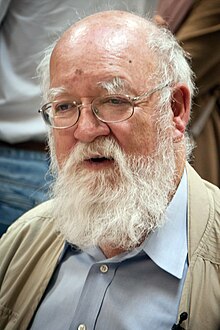Daniel Dennett | |
|---|---|
 Dennett in 2012 | |
| Born | Daniel Clement Dennett III March 28, 1942 Boston, Massachusetts, U.S. |
| Died | April 19, 2024 (aged 82) Portland, Maine, U.S. |
| Education | |
| Notable work |
|
| Spouse |
Susan Bell (m. 1962) |
| Awards |
|
| Era | 20th, 21st-century philosophy |
| Region | Western philosophy |
| School | |
| Institutions | Tufts University |
| Thesis | The Mind and the Brain (1965) |
| Doctoral advisor | Gilbert Ryle |
Main interests | |
Notable ideas | Heterophenomenology Intentional stance Intuition pump Multiple drafts model Greedy reductionism Cartesian theater Belief in belief Real patterns Free-floating rationale[3] Top-down vs bottom-up design[4] Cassette theory of dreams[5] Alternative neurosurgery[6] Sphexishness Brainstorm machine[7] Deepity[8] |
| Signature | |
 | |
Daniel Clement Dennett III (March 28, 1942 – April 19, 2024) was an American philosopher and cognitive scientist. His research centered on the philosophy of mind, the philosophy of science, and the philosophy of biology, particularly as those fields relate to evolutionary biology and cognitive science.[9]
Dennett was the co-director of the Center for Cognitive Studies and the Austin B. Fletcher Professor of Philosophy at Tufts University in Massachusetts.[10] Dennett was a member of the editorial board for The Rutherford Journal[11] and a co-founder of The Clergy Project.[12]
A vocal atheist and secularist, Dennett has been described as "one of the most widely read and debated American philosophers".[13] He was referred to as one of the "Four Horsemen" of New Atheism, along with Richard Dawkins, Sam Harris, and Christopher Hitchens.
- ^ a b Taylor, James E. "The New Atheists". Internet Encyclopedia of Philosophy.
- ^ "Eliminative Materialism". Stanford Encyclopedia of Philosophy. Archived from the original on April 20, 2024. Retrieved April 20, 2024.
- ^ Witzthum, Harry (2018). Reasoning Across Domains: An Essay in Evolutionary Psychology. Peter Lang. ISBN 978-3039109784.
- ^ "Cognitive Science as Reverse Engineering". pp.kpnet.fi. Archived from the original on January 16, 2018. Retrieved January 10, 2018.
- ^ Windt, Jennifer M. (2018). "Dreams and Dreaming". In Zalta, Edward N. (ed.). The Stanford Encyclopedia of Philosophy. Metaphysics Research Lab, Stanford University. Archived from the original on April 20, 2024.
- ^ "Quining Qualia". ase.tufts.edu. March 28, 2023. Archived from the original on January 2, 2019. Retrieved April 28, 2019.
- ^ Dennet, Daniel (1997). "Quining Qualia". In Ned Block (ed.). The Nature of Consciousness. Cambridge: MIT Press. p. 623. ISBN 0-262-52210-1
- ^ "This column will change your life: Deepities". TheGuardian.com. May 25, 2013. Archived from the original on November 16, 2018. Retrieved December 11, 2016.
- ^ Beardsley, T. (1996) Profile: Daniel C. Dennett – Dennett's Dangerous Idea, Scientific American 274(2), 34–35.
- ^ Rafael Yuste; Michael Levin (June 21, 2024). "Daniel C. Dennett (1942—2024)". Science (in French). 384 (6702): 1305–1305. doi:10.1126/SCIENCE.ADQ5873. ISSN 0036-8075. Wikidata Q126881738.
- ^ "Editorial board". The Rutherford Journal. Archived from the original on July 27, 2011. Retrieved December 19, 2016.
- ^ "The Story of The Clergy Project". The Clergy Project. November 11, 2014. Archived from the original on October 14, 2022. Retrieved September 11, 2022.
- ^ Kandell, Jonathan (April 19, 2024). "Daniel C. Dennett, Widely Read and Fiercely Debated Philosopher, Dies at 82". The New York Times. ISSN 0362-4331. Archived from the original on April 19, 2024. Retrieved April 19, 2024.